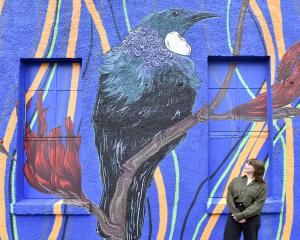
That was one of the main messages at the HopeWalk which travelled from the School of Dentistry to the Octagon in Dunedin on Saturday.
Among the more than 200 who attended the event were those who had lost friends and family members to suicide, including Kerry Rushton, a volunteer for the Life Matters Suicide Prevention Trust
Ms Rushton, who is also standing for New Zealand First in the South Dunedin electorate at the election in September, said breaking the taboos around mental health and suicide was important.
She had lost friends and family to suicide and the silence around the issue had made dealing with her grief more difficult.
''The first one was my foster brother when I was about 12 or 13 and it was never talked about.
''For about 10 or so years I used to have this guilt inside me that why didn't I know, why couldn't I have helped?''
Since she started volunteering with Life Matters, she had talked to some of the many other people affected by suicide, many of whom had the same feelings, which had made things easier.
There was still a long way to go, but she believed the stigma and taboos around mental health and suicide were beginning to lift.
This was important because it made it easier for people to ask for help and to help others who were at risk.
''The more we talk about the more it will be normalised that we all feel depressed at times and when we are like that we should be asking for help,'' Ms Rushton said.
Andrew, who did not want his last name published to protect the identity of his daughter, said he went to the walk to support the cause.
It was important to him because his daughter had twice attempted suicide.
He agreed the taboo around suicide needed to be lifted.
''It's not talked about and there is not a lot of funding there to help those which need the help.''
The HopeWalk was all about raising awareness of an issue that affected so many.
''It doesn't just affect one person, it affects the families; it affects the extended families and people end up with regrets.''
He recommended people with friends or family members at risk start by talking to them and getting hold of support groups. However, it could be very difficult.
''When people to get to that stage where they [attempt suicide] like my daughter did, she closed right off and it's very hard to talk to someone when they are closed off.''
Life Matters volunteer Irene Fuertes, who organised the walk, said she hoped the event would make people more comfortable talking about what were difficult topics.
She believed things were getting better, but more needed to be done to reduce New Zealand's terribly high suicide rates.
She pointed out that more New Zealanders died each year from suicide than car crashes and drownings combined.
''There are massive campaigns to avoid car crashes and drownings, but [comparably little] to avoid suicide.''
Need help?
Healthline: 0800 611-116
Lifeline Aotearoa: 0800 543-354
Suicide Crisis Helpline: 0508 828-865 (0508 TAUTOKO)
Samaritans: 0800 726-666
General mental health inquiries: 0800 443-366
The Depression Helpline: 0800 111-757
Youthline: 0800 376-633, txt 234 or talk@youthline.co.nz












